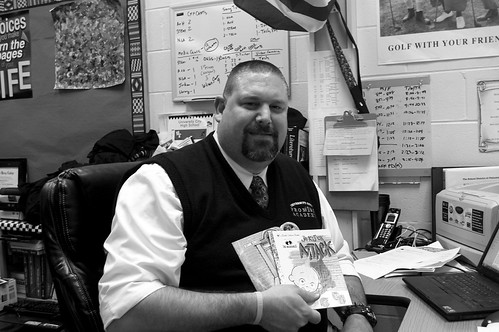
Promise Academy’s Harvey Scribner started “Random Acts of Literacy” by handing out books in public places.
Sometimes riding the same train every day can get boring, with the bumpy ride and usual delays, sick people and constant stops. But imagine what it’s like for a toddler, hardly able to hold still for more than 10 minutes.
Harvey Scribner, a technology teacher at University City Promise Academy, launched a new children’s book program in September called “Random Acts of Literacy.” The inspiration for Scribner’s initiative came about one day during an afternoon commute home on SEPTA’s regional rail.
Scribner was sitting behind a child–approximately two years of age–that he said reminded him much of his own sons, when they used to play as dinosaurs, being silly and mimicking Jane Yolen’s book, “How Do Dinosaurs Say Good Night?”
When Scribner got home, he decided to put the book in his bag to give to the young boy’s mother another time, since Scribner knew he’d be bound to run into them again during his daily commute.
They met again, and a month later Scribner was informed by the boy’s mom that he asks to read it every night.
Since this interaction, Scribner said he has given the same boy a couple of books, most of which were old books his sons no longer read.
Thus, this experience has prompted Scribner to continue this “random act of literacy” anytime he sees a young child who looks bored during a commute.
“I don’t say anything, I don’t introduce myself, I just quietly walk up and hand them a book and walk off,” Scribner said.
Scribner even talked of a time he handed out four books at once.
“Lately I have been writing the name of the website on the back of the book so that at least they know where it came from,” Scribner said, hoping that this “simple idea” goes viral.
Scribner has just recently posted printable bookmarks and stickers to put inside the books on his website, randomactsofliteracy.org, which are available for anyone who wants to participate in the initiative. Scribner said he also hopes to soon implement a link on his website for book donations.
“There’s thousands of teachers in the city and if we all just did it once, that would be thousands of books in kids’ hands,” Scribner said.
Now, Scribner said, he is not only promoting the “random act of literacy” during a commute, but also any time in the grocery store, or other public place, where children could use a book for distraction.
Scribner, who hopes to keep the initiative “anonymous and random,” said, “I’m not looking for a political soapbox or anything and this isn’t like some indictment of the education system, it’s just putting a book in kids’ hands.”
Still a fairly new concept, Scribner has not gotten any feedback from book receivers except the first boy, but has had “great feedback” from interested book-givers on the Random Acts blog and Facebook page, which is accumulating more members every day.
Through word of mouth, social networking sites and some Philadelphia news coverage, the program has been making its way into the minds of many supporters.
Julie Davis, a librarian at University City Promise Academy, came up with the name “random acts of literacy” for Scribner’s initiative. Davis, who has three kids of her own, said that she would “receive it well” if one of her own children was randomly handed a book.
“Being a librarian in Philadelphia, I am aware that we have a number of students that struggle with literacy, and I think that this could only improve literacy in [the] city,” Davis said.
“This could make a strong impact on [students’] ability to read and also developing a love for reading,” Davis added.
Scribner agrees with Davis, and wants this initiative to spark young reader’s interest in books.
“A lot of the kids, people have told me, they probably don’t have books at home. There are a multitude of places where they could get free books, but not everybody is in a position to take advantage of that if parents are working long days or other issues [come about],” Scribner said.
Since the program started, Scribner has personally given out more than 50 children’s books. He said he hasn’t breached the idea of middle or high school readers, because it is “hard to know what reading level people are at.”
“You don’t want to give somebody something that would frustrate them,” Scribner said.
Although, Scribner is not opposed to the growth of the program, and said keeping and carrying a book for a high school student “may not be a bad thing.”
“I enjoy doing it. It’s great. The kids seem to like it, it’s not offensive in any way, at least nobody has told me it is,” Scribner added. “And I’m not pushing some type of agenda, so it’s not like I’m handing out books on specific topics. I just get a bunch of free books and I hand them out.”
Lauren Hertzler can be reached at lauren.hertzler@temple.edu.


This story just doesn’t get old (for me!)
Jane Yolen